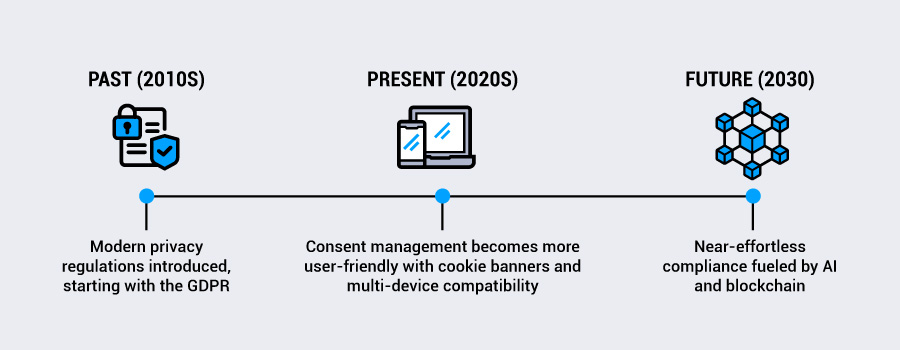Over the last decade, the digital landscape has undergone seismic transformations, similar in both scale and impact to the industrial revolution that disrupted the world in the early twentieth century. Everything has changed, and forward-thinking businesses have had to adapt at a staggering speed.
One of the most significant changes has been the compliance requirements of increasingly stringent data privacy regulations. The General Data Protection Regulation (GDPR), California Consumer Privacy Act (CCPA), and similar laws around the globe have fundamentally reshaped how companies collect, store, and use personal data.
At the core of this shift lies the Consent Management System (CMS), a pivotal business tool for navigating the complexities of data privacy.
With sweeping advancements in AI and machine learning — not to mention increasing regulatory oversight — CMS solutions are poised for a major transformation over the next decade.
By 2030, we predict that consent management systems won’t just be a mainstay for businesses large and small, but that they may even redefine how businesses operate and interact with consumers.
Here’s how the CMS will play a major role in shaping the future of industries worldwide.
From surviving to thriving in a world of evolving privacy standards
Before we discuss the future, let’s take a step back into recent history. As of this writing, the CMS has only fairly recently become a widespread technology, with commercial solutions only emerging to the forefront of tech in the mid-to-late 2010s.
A CMS, as we know it today, typically serves three functions:
- To collect, store, and manage user consent for data processing
- To enable ongoing compliance with new and evolving global and regional privacy regulations, frameworks, and policies
- To build and maintain trust with customers by providing transparency and enabling their control over their data
These systems are indispensable for highly regulated industries like ecommerce, healthcare, advertising, and finance, where sensitive customer data is collected and used at scale.
Challenges lie ahead for CMS developers and those who rely on them
As technology evolves, so must CMS tools. But this evolution isn’t without its challenges. Here are the four main challenges we’re seeing regarding the future of CMS.
Ever-changing privacy regulations
The first challenge, and the primary driver for the creation of CMS solutions years ago, is the increase in data privacy regulations around the world. Regulatory frameworks are becoming more intricate and demanding.
By 2030, even more nations are expected to introduce comprehensive data privacy laws, adding complexity for global businesses. Currently, about 82 percent of the world’s population is protected by privacy laws, according to the IAPP.
Additionally, there are relevant laws at the regional and industry levels, like those in over 20 US states, HIPAA in healthcare, and the GLBA in finance — and that’s just in the US.
Additionally, important tech platforms are introducing their own policies and requirements that must be met for businesses to maintain access to their platforms, like Google in the EU for Ads or Analytics.
The patchwork of compliance requirements will call for CMS tools with advanced flexibility and adaptability.
Evolving consumer expectations
Consumers today are more informed and assertive regarding their right to data privacy. A growing percentage of users are refusing cookies or opting out of data tracking entirely.
By 2030, CMS will need to shift from merely enabling compliance to being a trust center that can deliver seamless and transparent user experiences.
Rise of AI and machine learning
AI and machine learning have revolutionized many industries, and CMS is no exception. Advanced technologies are expected to enable personalized consent experiences and predictive compliance measures, but they also introduce heightened concerns over algorithmic biases, privacy, and data sensitivity.
Data proliferation
The volume of data being generated globally is exploding, with new devices, platforms, and technologies contributing to a broader data ecosystem. By 2028, Statista predicts that 394 zettabytes of data will be generated per year (a zettabyte is one trillion gigabytes).
Managing this data effectively and responsibly requires CMS solutions to scale while maintaining precision and security.
Key predictions for the future of CMS
By 2030, consent management systems will become more than compliance tools; they will be critical enablers of innovation, efficiency, and trust.
AI-driven consent experiences
Future CMS platforms will harness AI to offer more dynamic and personalized user experiences. For example, they could:
- Tailor consent requests based on user preferences and past behavior
- Predict and preemptively notify businesses of potential compliance risks
- Offer real-time compliance monitoring and automatic updates to meet requirements of new and changing regulations
This evolution will help to ensure that CMS tools become both more user-centric and business-friendly.
More automation and operational efficiency
Despite advancements in CMS technology, many systems still require significant manual interventions. Tasks such as regularly updating compliance settings, tracking cookie changes, and manually generating reports demand time and effort, increasing the risk of human error and inefficiency.
Tomorrow’s CMS solutions will significantly reduce these manual interventions. Features like automated audit trails, intuitive dashboards for real-time tracking, and seamless integrations across tools and platforms will enable businesses to stay ahead of compliance needs without overwhelming their teams.
Unified multi-jurisdictional compliance
For businesses operating globally, navigating multi-jurisdictional privacy compliance presents significant challenges.
Each jurisdiction enforces unique data protection regulations, such as the GDPR in Europe or the CCPA in California, which use different consent models, for example, and require tailored approaches for compliance.
These variations can lead to inefficiencies, as businesses must dedicate considerable resources to interpret, implement, and maintain each region’s requirements.
Beyond that, consider the difficulty of managing various enforcement timelines, updating vendor contracts to meet diverse legal standards, and tracking constant technology, operations, and regulatory changes.
Without an automated CMS that simplifies cross-border and industry-specific compliance, organizations often face increased risks of fines, data breaches, and reputational damage.
Future-proof CMS platforms will act as hubs for managing privacy compliance and user preferences across multiple jurisdictions. They will provide modular frameworks that adapt to specific requirements across different regions, industries, and operations, thereby helping to eliminate gaps and simplifying workflows for global enterprises.
Transparency as a competitive advantage
Transparency has emerged as a vital element in the modern business landscape, driven by shifting consumer expectations and stricter regulatory frameworks. Companies are now expected to provide clear insights into their practices, from data handling and privacy policies to supply chain operations.
This increased focus on transparency has not only fostered greater trust between businesses and their customers but also positioned it as a competitive advantage.
Organizations that prioritize openness are better equipped to demonstrate privacy compliance, mitigate reputational risks, and build long-term customer loyalty, all while navigating the complexity of evolving regulations with confidence.
By 2030, companies that provide user-friendly transparency about their data practices will enjoy even higher levels of trust and loyalty from their customers.
Consent management platforms (CMP) will continue to play a key role in aligning brand values with consumer expectations through easily accessible privacy policies, clear consent options, and ongoing communication with users.
Interoperability across platforms
Third-party applications are here to stay, and as more businesses rely on various tools and partners to get work done, this means CMS platforms also need to integrate smoothly across digital ecosystems.
At the same time, under many privacy regulations companies are responsible for contracted third parties’ privacy compliance in data processing. Future solutions will offer robust APIs and plug-and-play capabilities, helping to ensure smooth data flow and privacy compliance within broader organizational tech stacks.
Real-world applications of next-gen CMS
It’s easy to imagine all of this in theory, but what does it actually look like in practice? For businesses in highly regulated industries, a next-gen CMP can streamline what once were labor-intensive compliance workflows.
Imagine automating vendor consent updates across a network of partners, or receiving real-time compliance alerts when regulations change in a specific region — all managed through an intuitive, centralized dashboard.
Additionally, seamless integration with your existing tech stack means that legal, marketing, and IT departments no longer need to operate in silos. This results in not only increased operational efficiency but also better collaboration and reduced compliance risks organization-wide.
Here are a few more real-world examples of how an evolved CMS could make a difference.
Enhanced customer experiences in ecommerce
Imagine receiving a personalized and concise cookie consent banner that knows your past preferences and only asks essential questions, rather than a blanket statement or overwhelming block of text. AI-powered CMS will be able to deliver smoother shopping experiences for customers while maintaining privacy compliance for businesses.
Healthcare data compliance
Healthcare organizations face significant challenges in maintaining data compliance due to the sensitive nature of patient information and regulations like HIPAA and the GDPR. The complexity of managing large volumes of protected health information (PHI) across multiple systems increases the risk of breaches and noncompliance.
By 2030, CMS tools will help healthcare organizations manage increasing volumes of sensitive patient data, helping to ensure privacy compliance across regulations and making data sharing more secure and efficient.
Advertising and media
It’s no secret that the relationship between consumers and advertisers has become increasingly fraught as data privacy concerns grow. While advertisers rely on data to deliver personalized and effective campaigns, many consumers feel uneasy about how their information is collected, stored, and used.
This tension is further exacerbated by high profile data breaches and a lack of transparency, leaving consumers demanding stricter privacy protections and companies under pressure to adopt more ethical and compliant data practices.
CMS solutions will reshape the programmatic advertising landscape by enabling ethical and legal user data utilization, fostering greater trust between advertisers and end users.
Streamlined vendor management in enterprises
One challenge that enterprises continue to face is the complexity of managing vendors across different data ecosystems. These companies must ensure that all third-party vendors comply with relevant privacy laws and security requirements.
The manual effort required to track vendor activities, manage data sharing agreements, and monitor cookie updates adds significant strain on resources, increasing the risk of violations.
CMS tools will also simplify managing vendor relationships by automating consent collection and management, tracking data sharing agreements, and eliminating gaps in privacy compliance with operational and supply chain partners.
The path to 2030 success
Now is the time to integrate an advanced CMS into your business strategy. By 2030, privacy noncompliance will continue to bring the risk of heavy fines and other penalties that can stall growth, but risk even greater damage to customer trust, which is arguably the most valuable asset in an increasingly privacy-conscious world.
Here’s how businesses can start preparing:
- Stay ahead of regulations: Proactively monitor global, regional, and industry-specific relevant privacy compliance requirements and invest in a CMS solution that enables real-time updates.
- Leverage emerging technologies: Explore next-gen CMS platforms that utilize AI and automation for more effective consent management.
- Build transparent practices: Go beyond compliance requirements by focusing on providing clarity and real choice to build long-term trust with your users.
The evolution of consent management systems is set to reshape how businesses operate in the digital economy. By anticipating emerging challenges and investing in innovative CMS tools, forward-thinking organizations can not only enable ongoing legal compliance but also foster trust, efficiency, and growth.
Consent isn’t just about regulatory compliance anymore. It’s the foundation of customer trust and business innovation, and your CMS is at the heart of both.


